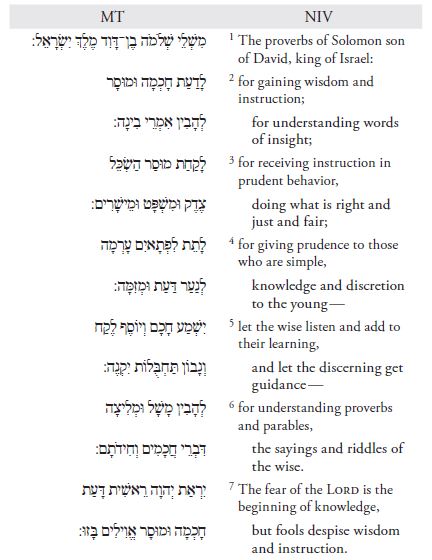Proverbs' Purpose Phrases - An Excerpt from Devotions on the Hebrew Bible
Many of you have put countless hours into studying Biblical languages. We are excited to offer a resource that encourages professors, students, and pastors to continue to use their Hebrew Bibles beyond their seminary years. Devotions on the Hebrew Bible can be used as weekly devotional or as a supplemental resource throughout a semester. The main point each devotion offers comes from a careful reading of the passage in the Hebrew Bible, not from the English Bible, and closes with a practical application.
In today's excerpt, Tremper Longman opens Proverbs to explore its purpose. Join us as we discover why God gave us this book of wisdom.
***
The book of Proverbs contains a collection of discourses (1:8 – 9:18) as well as proverbs (chs. 10 – 31) that come preeminently from Solomon (see 1:1, though see also 22:27; 24:23; 25:1; 30:1). The first seven verses form the preface, which orients us to reading the book in a way that maximizes the benefits we can gain from the collected wisdom of the sages.
 The most striking syntactical feature of these verses is the extensive use of the infinitive construct with a prefixed lamed ל) ) at the beginning of most of the five two-part parallel lines or bi-cola (vv. 2a, 2b, 3a, 4a, and 6a). This form indicates purpose, so if we want to discover what Proverbs is about, we must pay attention to these phrases.
The most striking syntactical feature of these verses is the extensive use of the infinitive construct with a prefixed lamed ל) ) at the beginning of most of the five two-part parallel lines or bi-cola (vv. 2a, 2b, 3a, 4a, and 6a). This form indicates purpose, so if we want to discover what Proverbs is about, we must pay attention to these phrases.
The first of the five purpose phrases is the most general. The proverbs are for “gaining wisdom and instruction” (v. 2a). What is wisdom and instruction? First, it is a practical skill of living, as becomes clear in other contexts where this word ( חכָמְָה ) is used (Exod 28:3; 31:6; Prov 24:3). Do you want success at work and a vibrant life with a happy family and good friends? Proverbs will point the way. Do you want to stay away from the behaviors and attitudes that lead to failure? Proverbs will warn you what to avoid. Indeed, the second purpose phrase (“for understanding words of insight,” v. 2b) tells us that not only does Proverbs impart wisdom, but it helps us to gain the ability to understand and apply these sayings (see also v. 6).
At first, the third purpose phrase (v. 3a) appears simply to repeat the thought of the first two and the fifth, though perhaps with more emphasis on the perspective of the reader or student. However, closer examination shows that the second colon (“doing what is right and just and fair”) takes wisdom to the next level. The wisdom of Proverbs is not only practical; it’s ethical. The wise are not only skillful; they are righteous.
While the first three purpose phrases speak from the perspective of the student, the fourth (v. 4a) comes from that of the teacher, the one who imparts wisdom to others. The wisdom of the book is for the “simple,” who are also characterized as “young.” Those familiar with the book of Proverbs will not be surprised here, since the discourses in chs. 1 – 9 are often addressed by a father to his son. The term “simple” here is best understood as immature, though the term may imply a bent toward foolishness, since “folly is bound up in the heart of a child” (22:15). What is surprising is that the audience is larger than just immature young men. The parenthetical statement in v. 5 uses jussives to point out that, though the book may directly address the immature young, it is even for the wise. Proverbs is important for everyone to read!
This preface prepares us for this book by telling us that its purpose is for us to gain wisdom and the ability to understand wise sayings and to apply them to our lives. Wisdom is not only practical; it is also ethical. According to the final verse of the preface, the foundation of wisdom is theological. One cannot even start being wise unless one has the proper relationship with God, a relationship characterized by “fear.”
Why fear? The Hebrew word (from the root ירא ) does not denote the type of fear that makes one run away. It is the kind of fear that recognizes that it is God, not we, who is the center of the universe. This fear breeds humility and an openness to listen to God’s advice about how we should live life as delivered through the book of Proverbs. (Pgs. 131-133)
Tremper Longman III
***
Devotions on the Hebrew Bible is available to purchase from Zondervan Academic today.
Thank you!
Sign up complete.
